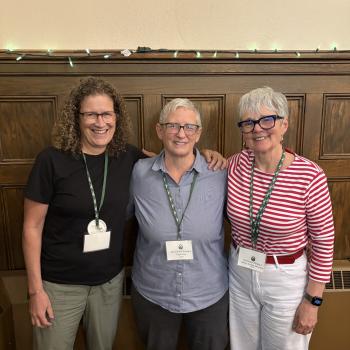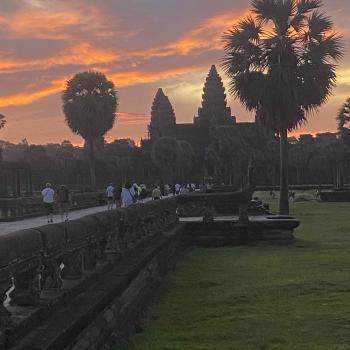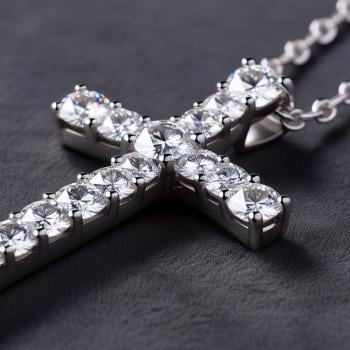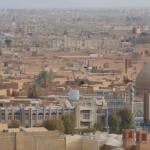What do we talk about when we talk about anti-Christian biases in the United States?
According to a February 2025 Executive Order, Christians in the U.S. are facing anti-Christian biases, including the “harassment” of “peaceful Christians” by government entities. The creation of a task force that month intends to eradicate “anti-Christian weaponization of government or unlawful conduct targeting Christians,” according to the Executive Order, protecting the freedom of Christians to worship without fear.
Four months later, Iranian Christians in the U.S. have been detained by Immigration and Customs Enforcement (ICE) and face deportation back to a homeland they had originally fled because of religious persecution. There are fears that the recent war between Iran and Israel and the decision of U.S. leaders to bomb nuclear sites in Iran might increase ICE efforts to detain and deport Iranian Christians. The subsequent warning of “Jihad Sleeper Cells” also makes Iranians living in the U.S. an easy target for ICE officials looking to demonize an immigrant population.
This is what we should be talking about when we talk about anti-Christian biases in the U.S.
Immigrants Fleeing Persecution Become ICE Targets
Christianity Today reported in late June that these fears have become a reality. The CT headline says it all: “Ice Goes After Church Leaders and Christians Fleeing Persecution.” Reporter Andy Olson narrates the experience of two Christians Iranians captured by ICE on a Los Angeles sidewalk. According to their pastor, Ara Torosian, the husband and wife had attended his congregation for about a year, having fled Iran because they were Christians and faced persecution there. Another family in Torosian’s congregation was detained by ICE the same week.
The Christianity Today article provides a compelling case to protect immigrants (Iranian and otherwise) fleeing persecution for being Christians. Those detained by ICE face deportation back to homelands where they will surely be targeted because they are Christians. Olson writes
The detentions add to a growing number of church members and Christians seeking religious protection who have been detained by Immigration and Customs Enforcement (ICE). Often they have no apparent criminal history. In many instances, they were in the United States lawfully, complying with orders from immigration courts. ICE has traditionally not deported individuals with pending asylum petitions, who are allowed to work while their cases proceed.
Lana Silk, Chief Executive Officer for Transform Iran, knows well the dangers Christians fleeing Iran face, because she works every day with Muslim converts who face peril for their conversion to Christianity in Iran. Many are forced to seek safety outside of Iran so they can continue to practice their faith–and serve the Christian church.

The Ministry of Transform Iran
Silk grew up in Iran, raised by Christian parents active in Iran’s central church in Tehran. The Islamic Revolution in 1979 changed everything for Silk’s family and other Christians living in Iran. It was no longer safe to practice their faith. Silk’s parents, Lazarus and Maggie Yeghnezer, felt called by God to leave their homeland, though they also felt called to continue transforming the church inside and outside of Iran.
“God needed my parents outside of Iran to continue to build the church inside Iran,” Silk said. Like so many other families who have left their homelands and rebuilt in a new place, this move was incredibly challenging, forcing them to leave the people and culture they loved for something completely new.
But in being faithful to what God has called them to do, Transform Iran has developed a strong network of support in the Iranian diaspora, as well as in Iran itself. According to their website, Transform Iran has developed underground networks to encourage home churches in Iran, and has helped shepherd more than 100,000 Iranians in their conversion to Christianity.
Being a Christian in Iran continues to be illegal. Silk described a close family friend who was stabbed seventeen times because he was a Christian. “The government wants Christians to be so afraid that they will stop being Christians,” Silk said, “and the regime tries to figure out who the Christians are, trying to weed them out.”
Choosing to deport Iranian Christians who have fled persecution will only imperil their already difficult lives: the refugee journey is often a harrowing one, and people don’t generally become refugees on a whim, or because they are seeking U.S. government handouts, stereotypes about the immigrant community that have often made them easy targets by those justifying deportation.
“A majority of Iranians cannot receive welcome in the West,” Silk said. “Many go to Turkey, which is most accessible .They are stuck in a system while they wait for their case to be decided, and are living in limbo.
“Now, Turkey is under pressure to deport Iranian Christians,” Silk added. “It is dangerous for them to be deported in this way.”
As Transform Iran seeks to support Iranian Christians, and to build the Christian church, Silk suggests there are actions that other Christians could also take to help these efforts. This includes extending hospitality to immigrants in their communities who have come to the U.S. seeking safety for their families and the freedom to worship Jesus.
Transformation Includes Hospitality
Even the seemingly simple act of sharing a meal with immigrants can be part of this transformation. “Middle Eastern culture emphasizes relationship and community in a much greater way than the west and its focus on independence,” Silk said. Inviting immigrants into your home can help build necessary connections, as can “asking what they left behind” and finding ways to “let them continue” the vocations they abandoned when they escaped their homes.
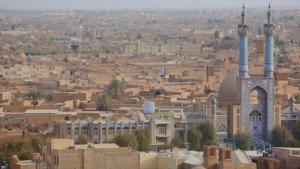
Fear and unknowing lead to prejudice, Silk says, and so these initial conversations can be one way to understand that immigrants are also image-bearers of our creator, seeking to live rightly in the world. “Once we get to know that immigrants are regular people, escaping the negativity of stereotypes, we will hear a different story,” Silk said.
Prayer for Iran and its people is also important, especially as the country is facing an inflection point. “Pray for the shifting of seasons,” Silk said. “God wants to see a liberation and a change for Iran.
“Iran could be a blessing and light, a support of Christianity and the growth of the church,” Silk said. “Pray for Christians, two million or more who are a light in the darkness. They are courageous people who are following Jesus.”
When we talk about religious persecution in the United States, I hope we can remember the Christians in Iran and the diaspora, and support the work organizations like Transform Iran are doing to help them: their fate is what religious persecution really looks like.
When pundits scapegoat immigrants for every societal ill, I hope we will remember that most immigrants are here because they are pursuing a life of security and joy and love which we all seek. And while every immigrant deserves a life free from persecution, I hope we will remember that 70 percent of all immigrants in the US Christians, our siblings in faith.
Supporting organizations like Transform Iran is one way to provide hospitality to people groups who need welcome now more than ever. You can read more about their work here.




